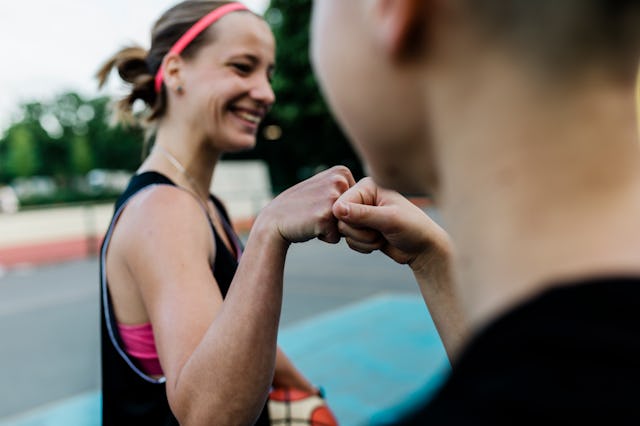I'm So D*mn Thankful I Get To Coach My Son's Team
I wanted to be more than “Connor's mom” — and I found it, as “coach.”

Back in the toddler days, whenever I picked my son up from daycare, the other children would swarm when they saw me. “Connor-ma, Connor-ma!” they called in their squeaky voices, tongues tripping over that hard r. I loved their delight, I loved that my son had started talking and could call me mom, but every now and then I’d wince, just a little, to myself. There was more to me than just being Connor’s mom, after all. I had a whole life — aspirations, hobbies, friends, adventures — that existed independently of my son. I didn’t want to erase all the other parts of my identity. My name wasn’t Connor-ma. That wasn’t me.
Around the same time, a Times opinion piece made the rounds, arguing persuasively that the next frontier in feminist mothering was coaching youth sports. I knew the article was speaking to women like me — high school soccer player/college ultimate frisbee/rec leagues ever since — but I was tired and the thought of adding something else to my to-do list made me want to curl up in a dark closet somewhere.
My son was a heavy and fast-moving toddler who needed constant supervision. I dreamed of a future where I could drop him off at his soccer practice and just get some time to myself. I thought with affection of all the dads, my own included, who populated my earliest sports memories. There were plenty of female coaches too, but they came later, when I was older. And they weren’t moms. They were young and cool and incredibly talented at the sport. I put the idea of coaching on the pile of things I should probably be doing but was never going to, along with cloth diapering, homemade baby food, zero screens.
I was already doing so much: I chaperoned field trips, volunteered to be room mom, took lunchroom shifts, served on our daycare’s PTA, plus the day-to-day grind of motherhood. No matter the role, it seemed the primary goal was for me to fade into the background, all part of the gift of a magical g*dd*mn childhood where everything just happens.
When I finally got around to signing up to coach my son’s fourth grade Ultimate Frisbee team, it wasn’t because I was so inspired by the fact that only 25% of youth sports are coached by women. It was because I knew it would guarantee my son a spot on the team. Coaching would be like all my other volunteer jobs — harrowing and strenuous.
Here’s the thing, though: I love Ultimate Frisbee. I learned to play in college and have played recreationally ever since. I’m not great, but I’m not terrible, something that has never been a problem for the teams I’ve linked up with. I show up, I run hard, I play fair, I support my teammates, everyone has fun. I wanted the kids to feel the same way and now that I was in charge, it was on me to make that happen. And boy, did I embrace that role.
All my overachieving tendencies kicked in. I attended multiple optional coaching clinics in addition to the five hours of online health and safety trainings mandated by the league. I made detailed practice plans and sent them out to the Assistant Coaches — why yes, I had made myself Head Coach — ahead of time each week. My coach’s bag had Band-Aids, cones, and a binder complete with practice agendas, pre-game checklists, printed field maps, spreadsheets for tracking playing time. I was reminded of the way I sometimes felt during group projects in high school: vaguely aware that I had bulldozered my way into the lead, but also certain that I had guaranteed success for all.
For once I wasn’t trying to fade into the background. I wanted every kid looking at me, listening to me, doing what I said. I wanted them to see and experience the hard work of being terrible at something until slowly, imperceptibly, you become less terrible. This was my show, and everyone had to live by my rules. Making mistakes was not a problem, but yelling at your teammates for making mistakes would not be tolerated. The kids were eager and largely attentive. Even when they were being 10-year-old nitpicking nightmares, insisting they knew the rules (they didn’t), they were engaged. Their dedication to the game and to each other was fresh and invigorating.
Midway through the season, I found myself in the fourth-grade hall during the school day. I saw one of my players and called out to her in greeting. In the past, when I said hello to my son’s friends, I could recognize the embarrassment and terror of interacting with me. I remembered it from when I was a kid — what did this parent want from me? What in God’s name was I supposed to call them? But she didn’t react with any of that. She gave me a long nod, accepting my presence as something not be avoided, but acknowledged.
“Coach,” she said.
That’s me. Coach.
Carolyn is a writer, teacher, and editor based out of Seattle. Her work has appeared in Bellevue Literary Review, Lilith, and McSweeney's Internet Tendency. She has two kids in elementary school, an aging rescue dog, and way too many houseplants. Follow her on Instagram: @carolyn.abram